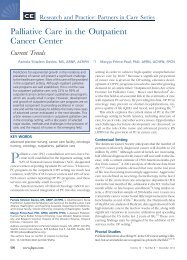social work practice and the law - Springer Publishing
social work practice and the law - Springer Publishing
social work practice and the law - Springer Publishing
Create successful ePaper yourself
Turn your PDF publications into a flip-book with our unique Google optimized e-Paper software.
1. Identifying <strong>the</strong> Legal Needs <strong>and</strong> Realizing <strong>the</strong> Rights of Social Work Clients 7<br />
for <strong>the</strong> incarceration of a loved one or provider suggests a number of legal<br />
decisions that need to be made, rights to uphold, <strong>and</strong> arrangements such as<br />
visiting <strong>and</strong> ways for parents to remain involved in <strong>the</strong> lives of <strong>the</strong>ir children<br />
to be put in place even though <strong>the</strong> parent may be incarcerated (Legal Information<br />
for Families Today, 2010). Helping a client advocate for a child in jail<br />
who may need mental health treatment but is denied access may be ano<strong>the</strong>r<br />
instance of a legal right <strong>and</strong> <strong>social</strong> service need being linked. Certainly,<br />
<strong>work</strong>ing with a youth or adult who has reentered <strong>the</strong> community <strong>and</strong><br />
wishes to continue or pursue education or vocational training as a way of<br />
remaining free of <strong>the</strong> system but does not initially have access to funding<br />
can be a problem that presents to many <strong>social</strong> <strong>work</strong>ers. We see again how<br />
issues we might initially define as <strong>social</strong> service outcomes also have a corresponding<br />
legal component.<br />
Once arrested, <strong>the</strong> most pressing legal need low-income individuals<br />
have is access to an effective attorney who can ensure that <strong>the</strong> client receives<br />
a proper defense <strong>and</strong> that <strong>the</strong>ir rights are protected <strong>and</strong> were not violated<br />
prior to <strong>and</strong> during <strong>the</strong> arrest process. Unlike many civil legal issues, clients<br />
who enter <strong>the</strong> criminal justice system have a constitutional right to a <strong>law</strong>yer.<br />
The Sixth Amendment to <strong>the</strong> U.S. Constitution establishes <strong>the</strong> right of<br />
federal criminal defendants to counsel, a right which was extended by<br />
<strong>the</strong> U.S. Supreme Court to defendants in State <strong>and</strong> local criminal prosecutions<br />
because of <strong>the</strong> “obvious truth” that a fair trial <strong>and</strong> a defendant’s right<br />
to due process could not be guaranteed without an attorney (Gideon<br />
v. Wainwright, 1963).<br />
A publicly funded attorney or a public defender office represents <strong>the</strong><br />
majority or 80% of low-income defendants (National Right to Counsel<br />
Committee, 2009). Numerous reports have documented <strong>the</strong> inadequacies of<br />
low-income defense services (American Bar Association St<strong>and</strong>ing Committee<br />
on Legal Aid <strong>and</strong> Indigent Defense, 2004). Due to lack of resources, increasing<br />
criminalization of behaviors due to “tough on crime” policies on <strong>the</strong> part of<br />
state <strong>and</strong> local governments, <strong>and</strong> <strong>the</strong> increasing complexity of criminal <strong>law</strong>,<br />
public defenders are forced to carry large caseloads, in some instances, 100<br />
clients at a time, that make it impossible to effectively defend <strong>and</strong> represent<br />
<strong>the</strong>ir clients (National Right to Counsel Committee, 2009) Ano<strong>the</strong>r aspect<br />
of ensuring effective representation that is often lacking due to low public<br />
funding is access to experts, <strong>social</strong> <strong>work</strong>ers, investigators, interpreters, sufficient<br />
client contact, <strong>and</strong> investigation.<br />
Many of <strong>the</strong> clients who are represented by public defenders are<br />
charged with serious crimes having serious consequences including extended<br />
periods of incarceration <strong>and</strong>, in some states, death. Perhaps <strong>the</strong> most<br />
compelling reason for <strong>social</strong> <strong>work</strong>ers to be aware of <strong>the</strong> legal concerns of<br />
criminal defendants, including <strong>the</strong> lack of effective representation <strong>and</strong><br />
racial injustice, are <strong>the</strong> increasing number of wrongful convictions that<br />
are being reported by organizations such as The Innocence Project (http://<br />
www.innocenceproject.org) <strong>and</strong> <strong>the</strong> Death Penalty Information Center<br />
(http://www.deathpenaltyinfo.org). There have been 261 postconviction<br />
DNA exonerations in <strong>the</strong> United States. The average length of time serviced<br />
by those exonerated is 13 years. Of <strong>the</strong> 261 individuals, 155 were African
















